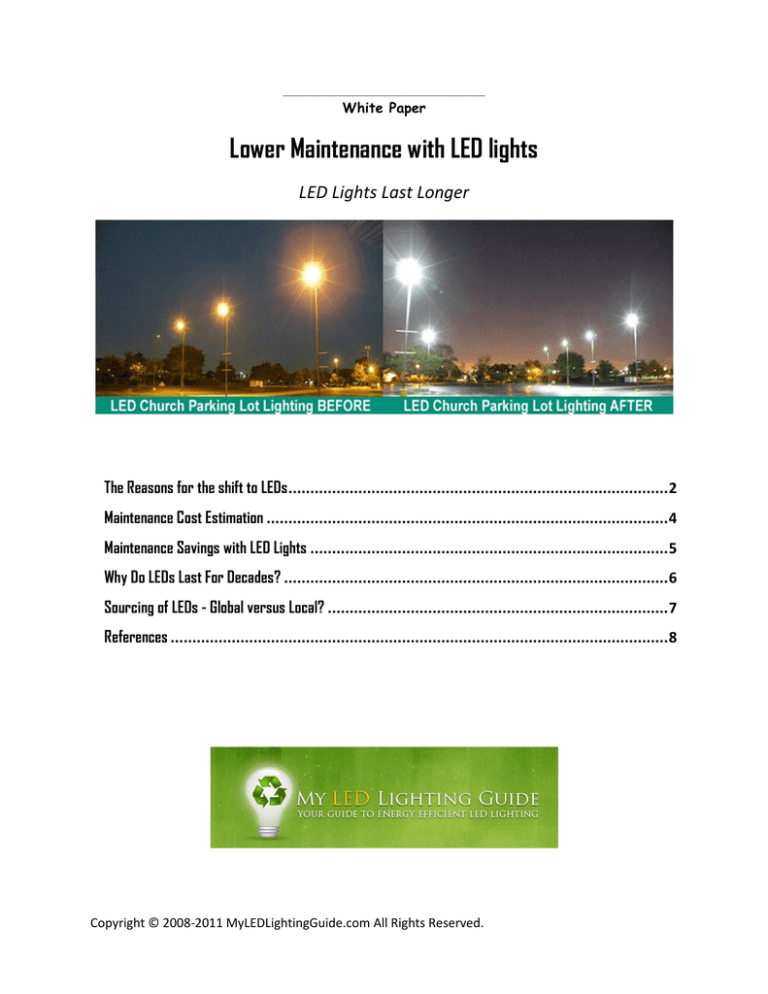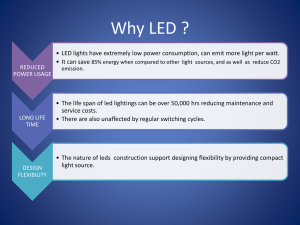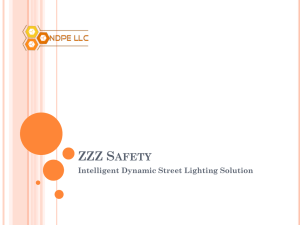Lower Maintenance with LED lights
advertisement

_________________________________________________________________________________ White Paper Lower Maintenance with LED lights LED Lights Last Longer The Reasons for the shift to LEDs ....................................................................................... 2 Maintenance Cost Estimation ............................................................................................ 4 Maintenance Savings with LED Lights .................................................................................. 5 Why Do LEDs Last For Decades? ........................................................................................ 6 Sourcing of LEDs - Global versus Local? .............................................................................. 7 References .................................................................................................................. 8 Copyright © 2008-2011 MyLEDLightingGuide.com All Rights Reserved. Executive Summary _____________________________________________________________________________________ Maintenance cost savings are a significant part of the benefits accruing for the adoption of LED technology. Companies and municipalities are adopting LED lights as these will allow them to improve service levels and reduce costs. Lower maintenance costs come from the exceptionally long life of LED powered luminaries. Payback period for LED luminaries ranges from 1- 3 years depending on labor costs and the nature of applications. The most significant energy and maintenance savings are realized from lights used in stairwells, emergency lights, etc that remain switched on 24 X 7. For outdoor lights that need cherry pickers and U haul trucks to replace, the maintenance savings are substantial and breakeven is achieved quickly. For safety and security applications - like slippery floors in poultry processing companies, perimeter lighting etc. the failure of a light can have unacceptable consequences. In these areas, the long lifespan of LED technology makes it the best choice. In this white paper we shall walk through the maintenance cost savings that are possible with LED technology. ____________________________________________________________________________________ The Reasons for the shift to LEDs LED parking area lights (8040 Lumens) appear to be brighter than HPS light (19,000 Lumens) due to scotopic advantage, better Color Rendering Index and more uniform light spread. (Public domain image from– The Office of Energy Efficiency http://apps1.eere.energy.gov/buildings/publications/pdfs/alliances/outdoor_area_lighting.pdf) Copyright © 2008-2011 MyLEDLightingGuide.com All Rights Reserved. and Renewable Energy Companies and government offices are installing LED by the droves. There are several reasons behind this shift Energy efficiency - often talked about as a major reason, in reality, it is merely the tip of the mountain of cash an organization can save by adopting LED technology. Gains in productivity and Maintenance savings - are not talked about as often as energy savings but are equally or more important when it comes to determining financial value of your decision to invest in LED lighting. The ROI and payback period calculations take on an entirely different appearance when all the gains are factored in. The Basics of Good Lighting Color rendering, light uniformity, and color temperature are the first boxes that a light must tick before a company can consider it for its energy savings. LEDs exceed all criteria. Whether it is a hotel looking for mood lighting, a jewelry store looking for highlighters, or a garment store in need for a good wall washer – LEDs fit the bill. The color rendition is good enough for LEDs to be used in museums for illuminating paintings. As far as light color temperature is concerned, the range of color temperatures available from warm lighting for hotel lobbies to cool daylight for hospitals. Energy Savings We shall look into the energy saving potential and productivity gains from LEDs in separate white papers. Here we shall limit ourselves to stating that LEDs are the most energy efficient technology around. They consume 10 times less energy than incandescent bulbs and 3 times less energy than fluorescent tubes for producing comparable results. Maintenance Cost Components Maintenance savings stem from the following 1) Cost of time to report light outage 2) Cost of material for repairing non functional lights 3) Labor costs for the replacement of bulbs/ ballast/ striker etc. Copyright © 2008-2011 MyLEDLightingGuide.com All Rights Reserved. LED advantage Light Emitting Diodes last 50,000 to 100,000 hours and they employ neither ballasts nor strikers. The result is dramatically lower maintenance needs. When considering the maintenance costs arising from a particular lighting option one must factor in the maintenance requirements arising from system characteristics. These include vibrations, general environmental conditions, ballast life, bulb life and incidence of striker failure. The life span of different lighting options and maintenance needs are summarized in the table below. LED HPS Fluorescent tubes CFL Incandescent Bulbs Estimated Life Span (Years) 34 2 1 Maintenance cycles Ballast Maintenance Striker failure Nil 17 34 Nil 3 4 Nil 3 4 Total maintenance cycles Nil 23 42 1 6 months 34 68 NIL NIL NIL NIL 34 68 The incandescent bulb is history The high maintenance costs and legislation against energy inefficient lighting has practically sealed the fate of the incandescent bulb as a practical lighting option. While some users still prefer it for its light quality the rapid strides in LED light quality will soon make this two century old technology irrelevant. Maintenance Cost Estimation Maintaining outdoor lighting is usually more expensive primarily because each visit needs a team of workers equipped with tall ladders or cherry pickers and U haul trucks. In the case of streetlights the team must contend with traffic and choose an off peak time for repairs. The city of Ann Arbor estimated the cost labor and equipment for each maintenance visit to be $211. They estimated this cost for ten foot high lights. The cost for higher streetlights and car parking lights and highbays can be reasonably be expected to be similar. For typical office lights the cost would be close to $ 50. Copyright © 2008-2011 MyLEDLightingGuide.com All Rights Reserved. Once the bill of materials and the relevant labor charges are in place a simple spread sheet reveals the potential maintenance savings with LED technology. Maintenance Savings with LED Lights The table below demonstrates the annual and life time maintenance savings potential of LED lights. Life span (Yeas) Cost of each scheduled maintenance ($) Cost of bulb or ballast replacement ($) Frequency of bulb/ballast replacements per light per year Maintenance Dollars Spent Annually ($/Year) LED advantage -Annual Maintenance Savings ($/Year) Total Savings over 34 years Fluorescent Tubes Easy High Bay Access 1 1 50 150 LED Lights Sodium light CFL Incan. bulb 34 0 2 211 1 50 0.5 50 0 50 0.5 6 1 6 1 6 1 2 2 $0 $131 $56 $156 $56 $104 $131 $56 $156 $56 $104 $4,437 $1,904 $5,304 $1,904 $3,536 The table above shows the potential savings of a single LED bulb as opposed to other lighting options. There are two things about the table above that must be kept in mind 1) The table looks at only the maintenance savings of Led lights and it does not include savings from energy efficiency, reduced air-conditioning bills or disposal costs for mercury containing lighting products. 2) Unlike Fluorescent tubes LEDs are scalable. Thus a single LED device can replace a 4-6 tube high bay fixture. In such cases the maintenance costs of a single high bay fixture will be 3-6 times that of a single fluorescent tube and the gains from using LED technology will be even more significant. Energy Savings Sodium lamps are the most energy efficient and require the least maintenance among all the older technologies. This is why they were used widely for street lighting. Sodium lamps were not preferred for applications that required good light quality and thus offices used incandescent bulbs and fluorescent lights while workshops and factories used metal halide highbay lamps. Space restrictions will not permit us to analyze all the lighting options. We are restricting further Copyright © 2008-2011 MyLEDLightingGuide.com All Rights Reserved. analyses to sodium lamps only. The results with other lighting options like fluorescent lights are better than those with sodium lamps. LED Luminaire Energy consumed by Luminaire (Watts) Energy rate ($/kWh) On-time of light per day (hours) Energy Consumed Annually(kWh) Annual Energy Savings(kWh/ year) Annual Energy Costs ($/year) Annual Energy Savings ($/year) Annual Maintenance Savings ($/year) Total Annual Savings 75 0.15 12 329 460 $49 $69 $131 $200 Sodium Luminaire 180 0.15 12 788 Nil $118 The 10 year cumulative savings projections of a single solid state light are shown below. Why Do LEDs Last For Decades? LED lights have a light emitting diode, driver electronics, cooling system and optics. None of the components is fragile like bulb filaments nor are they sealed under high pressure as in the traditional high wattage bulbs. The LED is only as good as the life of its components. Of the different components of an LED, the following can fail Copyright © 2008-2011 MyLEDLightingGuide.com All Rights Reserved. a) The light emitting diode - The diode is a solid state device, without the burden of fragile coils pr high temperature operations the diode has a very long life. b) The electronic driver – The driver is usually the limiting factor when it comes to life of LED bulbs and tubes. Low quality soldering of components, poor quality of components, excess heat generation and build up are the usual causes of failure of electronic components. Metal core printed circuit boards that conduct heat away, advanced driver design to minimize heat generation, driver placement to minimize exposure to heat, specialized metal fins to conduct heat away and the use of active cooling systems ensure the longevity of LEDs. Owing to space restrictions it is not possible to review these in this white paper. Sourcing of LEDs - Global versus Local? After the economic meltdown the US government has put in place several measures to attract manufacturing jobs to United States. LED light industry is one of the green technology industries that are instrumental in creating jobs in US. Buying US made products ensures that you are eligible for government grants that can dramatically alter the financial return calculations of your project. Moreover products made in US are generally manufactured to more stringent standards than in several developing countries. The full advantage of reduced maintenance cost can be harnessed by using US made LED luminaries. As far as LEDs are concerned buying local makes for emotional, national, environmental and financial sense. Copyright © 2008-2011 MyLEDLightingGuide.com All Rights Reserved. References 1. Rebecca Atkinson, Is now the time to invest in LED lighting. Museum Practice, January 2011. 2. Ann Arbor’s LED streetlight program, Retrieved from http://www.a2gov.org/government/publicservices/systems_planning/energy/Documents/ LED_Summary.pdf. 3. Sam Berman, the Coming Lighting Revolution in Lighting Practice, Energy User News, 23-25, 2000. 4. Illuminating Engineering Society of North America (IESNA) (Ed: Rea, M.), Lighting Handbook 9th Edition, New York, NY, 2000. 5. United States Department of Energy, Energy Efficiency and Renewable Energy Building Technologies Program, 2008. Copyright © 2008-2011 MyLEDLightingGuide.com All Rights Reserved.


